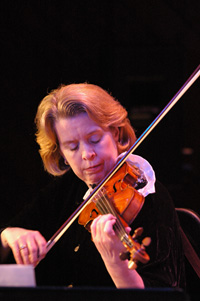"I teach private violin lessons and a performance lab, which is run like a master class. Berklee students don't often have to stand and deliver solo violin music for one another. So in this lab, about every other week, each student is required to perform a solo piece in front of the class, be it a concerto movement, a Bach unaccompanied movement, or an étude. We do a general critique, and I work with the student."
"I get quite a cross section of students with a large range of interests. They don't always play a classical piece. Some of them play whatever jazz piece they're working on, or a fiddle piece. You work on the same technical issues with students one way or another. It doesn't matter whether they're jazz or classically oriented or whatever, because they all have to do the work on their instrument."
"Playing a stringed instrument is ridiculously difficult, and everybody has the same issues. But when you're alone in your practice room, or just in front of your teacher, you don't deal with a bowing problem the way you do if you're sitting in a class and someone else has the same problem. But the hardest thing to do is to play front of your peers. If you can stand up in front of other string majors and play a piece that people know is difficult and not feel that everyone in the room is there to tear you apart, it's really lovely."
"There's this continuum: the best teachers in my life gave me so much, and not to pass that along seems to me a great disservice to music. Teaching constantly improves my own playing, because when you teach, you have to analyze what's going on with someone else and how they can improve. I sometimes hear myself saying something to one of my students and I say to myself, 'Right; don't do that!' It's fabulous. I believe you learn as much as you give when you're teaching."

